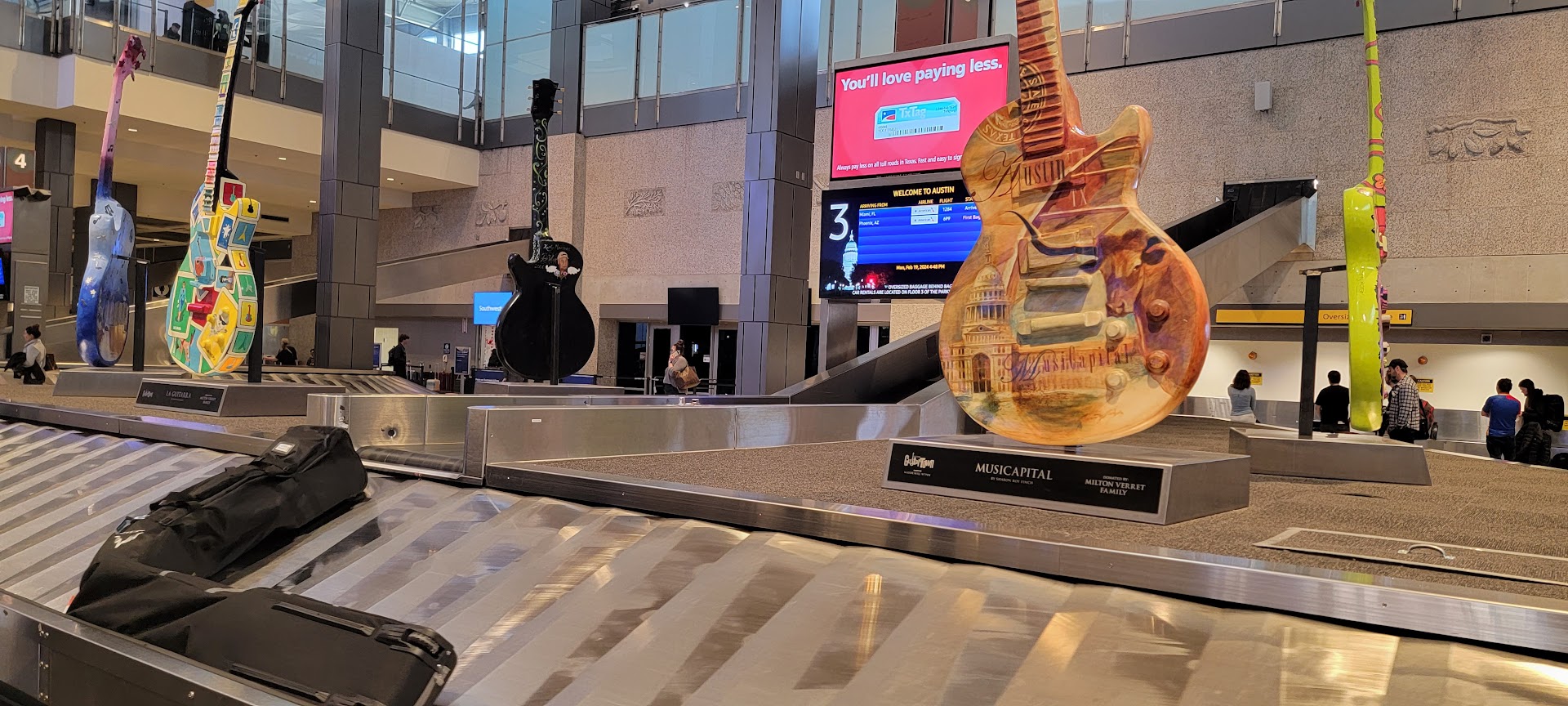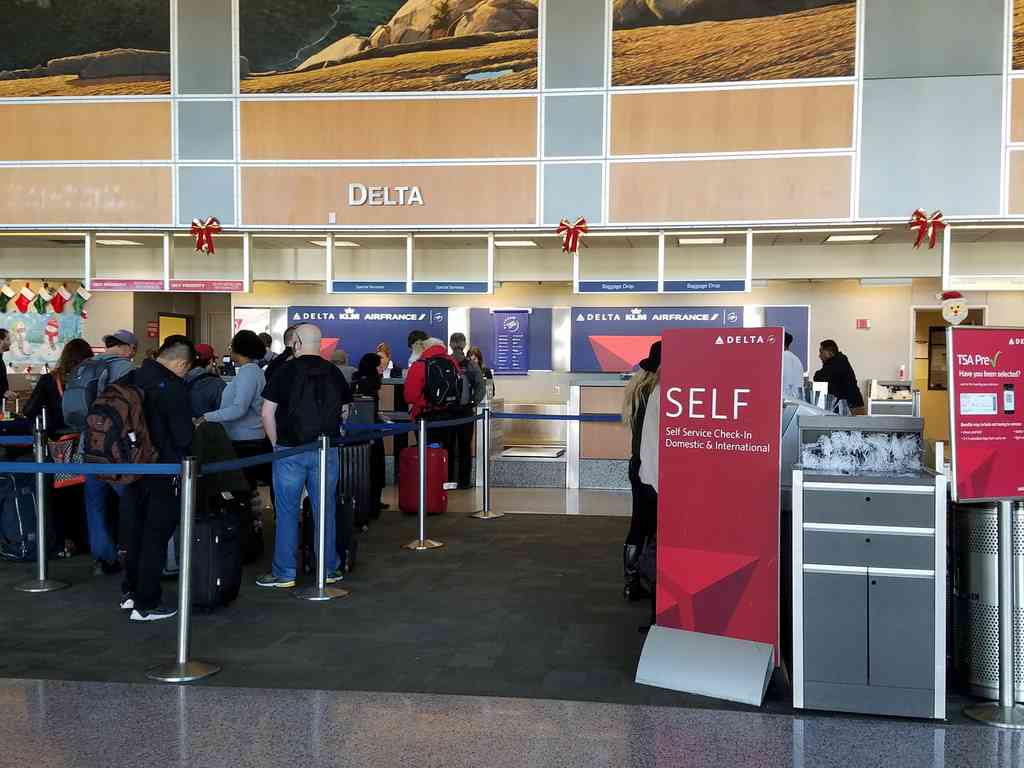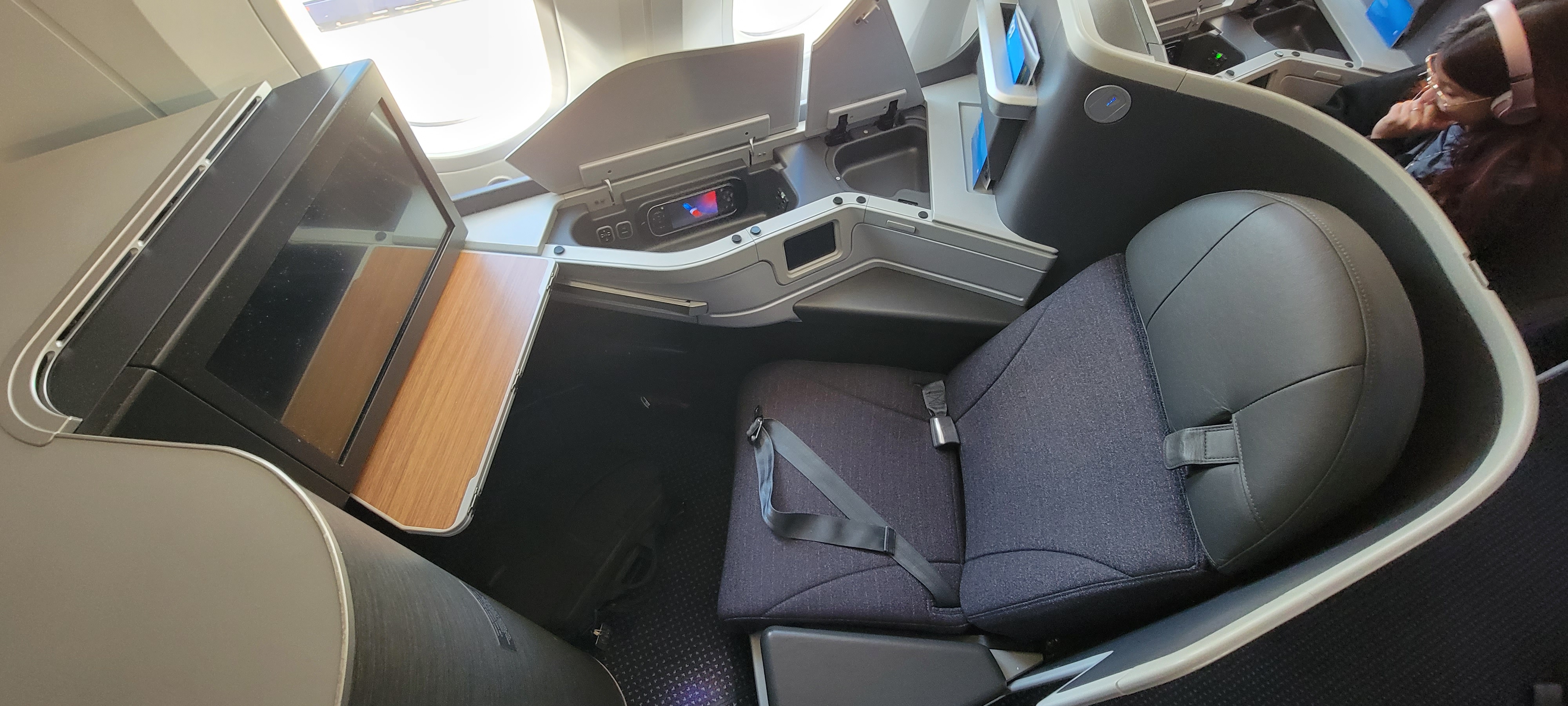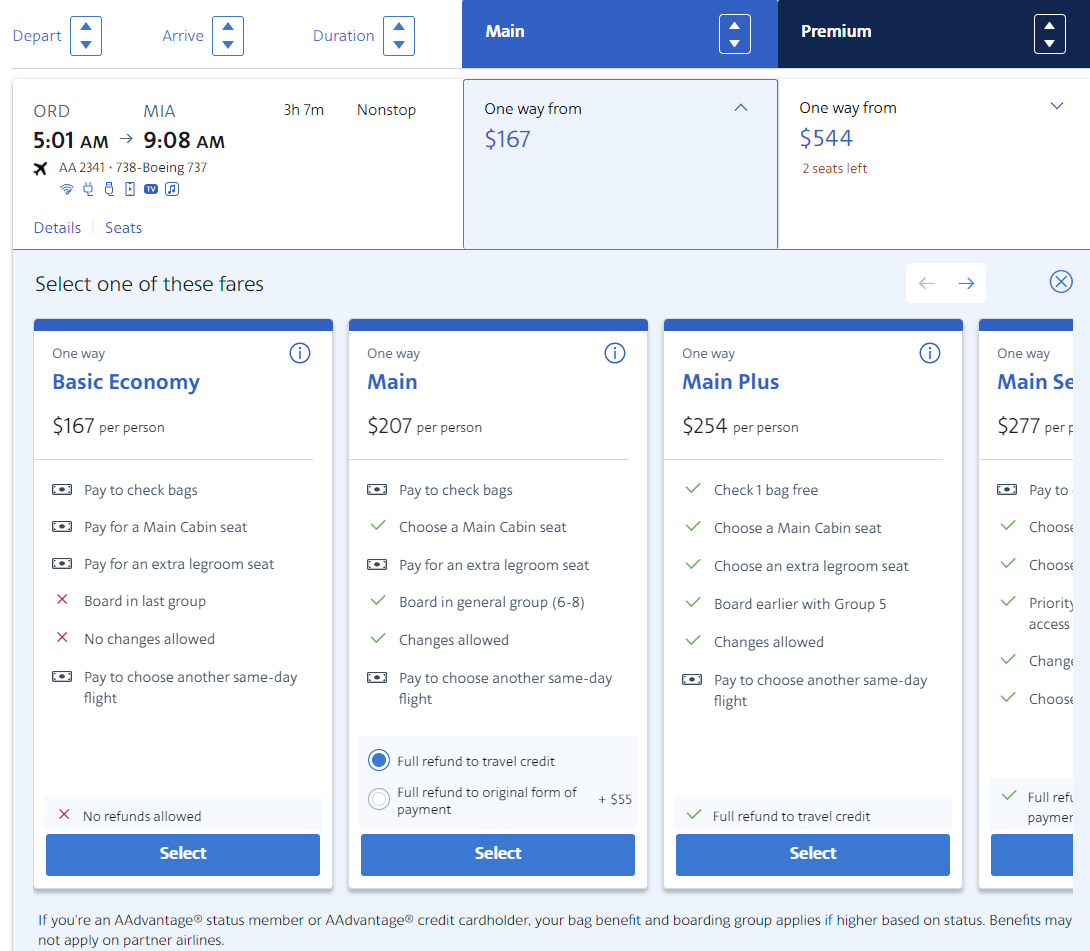In April the U.S. Department of Transportation issued a new rule on fees requiring airlines and ticket agents to fully disclose all add-on costs for baggage, changes, and cancellations upfront at first instance of displaying itineraries and fares. It also requires airlines to automatically and promptly refund passengers when services like checked baggage and Wi-Fi are not delivered as promised.
Airlines sued to stop the rule, and the U.S. Court of Appeals for the 5th Circuit has issued an injunction suggesting that the carriers are likely to prevail on the merits, and suffer irreparable harm if the rules go into effect in the meantime. DOT itself estimates the cost to comply with the new rules in the hundreds of millions. The full court will hear the case.

Very Little Benefit, And You Can’t Opt Out Of The Clutter
For the most part airlines already disclose fees fairly well. This isn’t going to bring much new information to consumers, and it will add a new layer of complexity to fare search. For most passengers, at best it’s additional clutter on the screen likely to fade into the background, like terms and conditions that nobody reads.
Consumers are not even permitted to opt out of these fee displays (!) – unless the airline first gets certification from the customer that no one on the reservation will travel with a carry-on bag or first or second checked bag. You can’t even save this as a preference in your customer profile since it’s specific to each given trip.

Fees Are Already Well-Disclosed (Usually)
I used to think that fees were well-disclosed and most of the time they are. First checked bag fees have been in place for 16 years and everyone knows to expect them. They’re on airline websites, easily accessible. Most of the time there are no surprises! But I was shocked this year when JetBlue quietly raised bag fees twice this year without telling anyone, or even anyone noticing for a couple of weeks, while this rule was pending. Maybe the rule should apply only to JetBlue.
There are a few other edge cases where airlines do a bad job disclosing fees. For instance, I’ve documented the way that American Airlines sells refundable business flexible fares that entail a $500 refund fee that almost no one knows about until they go to request a refund.

Prepare To Wait Longer On Hold When You Call An Airline
Each call to reservations that involves searching for flights will take a little longer as reservations agents read out required fee information. As each call takes longer, telephone hold times will get worse – by the way, DOT does not assume that airlines will add call center agents to address this (or else that would have driven up costs of the regulation).

We’re Stuck With Seeing Only The Fees The Government Has Chosen, Even As Fees Change
The government has picked and chosen which fees matter, fixing those in place even as what fees airlines charge change. DOT has decided that consumers are supposed to know about bag fees and change fees, but not all fees. It leaves out some of the more confusing fees, for instance it doesn’t require disclosure of fees for oversize or overweight fees, where policies vary by airline.
And rules tend to remain fixed even as fees being charged change – basic economy fares for instance were largely a non-issue the last time that DOT looked at this. United and Delta are both talking about greater unbundling of their premium products.

A Major Issue Is Whether Benefits Of The Rule Outweigh Costs
In promulgating a rule under its broad power to ensure a safe and efficient air transportation system, it matters whether they’re addressing an actual problem and it also matters whether the benefits of the rule outweigh its costs.
DOT claims that the rule will “save [consumers] over half a billion dollars every year that they are currently overpaying in airline fees.” That is simply not true.
- DOT says that consumers go on a search for fees when buying tickets, but having those fees included up front in search saves them time.
- According to DOT, that is almost the entire source of the savings (“time savings benefits are expected to range from $365 million to $484 million annually”).
- There will be some savings from forcing airlines to refund check bag fees when bags are significantly delayed. And maybe someone is paying for seats not realizing that they won’t be forced to stand if they do not do it (although an advance seat assignment reduces your chances of being bumped off a flight).
- Meanwhile DOT estimates that the rule will cost airlines “$239 million to $331 million annually.”
They needed to manufacture a consumer benefit larger than the cost of compliance in order to justify the rule, if their general authority even allows them to do it, but they do not even back out the consumer cost of having to wade through extra information, further complicating the process of buying tickets.
We Should Encourage Competition, Not Enforce Conformity
In ordering refunds for services not provided, DOT makes a lot of sense. That seems to be within their rulemaking authority. But deciding what information every consumer has to see before buying a ticket, when it’s rarely a surprise or hard to find information to begin with, DOT goes too far in commoditizing the air travel market.
- The DOT rule would benefit Southwest, which includes checked bags with every fare. It’ll make them look cheaper than competitors.
- But it moves in the wrong direction. Showing just schedule and price means airlines compete on schedule and price and not experience. Locking in – by law – that airline pricing is shown with bag and seat fees means they compete on the price of those things, and not the quality.
- It would be better to focus on information on seat width and pitch available, quality of wifi (bandwidth and latency for instance), meal service etc. Or at least to let online travel sites compete to give consumers the best, most relevant, and useful information to them in making choices.
DOT should certainly enforce refunds for services charged but not provided. But they shouldn’t lock airlines and airfare search sites into displaying specific charges in a standardized way, the same everywhere. We should be encouraging competition in meeting consumer needs, not making airline sites and Expedia displays the same forever. It’s not only seat and bag fees that matter – and even those don’t always matter!


“There are a few other edge cases where airlines do a bad job disclosing fees”.. or in other words ” where airlines do a great job of hiding fees”
The 5th Circuit continues to be a joke
Time to also place term limits on the appeals courts. How dare they limit what regulators can do to make life so much easier for everyone!
Our Ivy League educated, dictatorial minded dolts in the government know what best for everyone Gary. Your job is to convince everyone to get with the program. No independent thinking is needed or allowed–our government know what is best for us peons.
Sorry, these rules are necessary. Maybe not in the exact way implemented, but you need to start somewhere.
Everyone looks at the fare, chooses the cheapest one (without noticing or caring at the time, what’s included or not), then complains about the fact they don’t get to choose a seat, have to pay for a checked bag or snack onboard. Heck, in many cases, buying a fare on spirit is going to end up costing more, in the end, than one on United or Delta. So as long as the bulk of passengers remain idiots (let’s face it – it’s true!) or ignore the common items associated with traveling, it’s needed.
You say they do a pretty good job of disclosing fees… And that disclosing fees would be expensive and an awful experience. Which is it?
If they generate do a pretty good job of disclosing bag fees than obviously the burden of disclosing these fees isn’t a problem…
@gerg – following the DOT prescriptions for how fees must be disclosed, reprogramming the booking path of every fare and schedule display, would be expensive. Listing out fees on an easily accessible web page is not.
This feels more like propaganda from the airlines than actual journalism. Some of the points are valid but the presentation makes it clear the purpose is to manipulate opinion not inform.
What would help is the actual ticket booking class listed with all fares from airline sites, OTA’s etc
Its a bummer when u find your purchased ticket may not qualify for any, of low percentage ff mileage !
The 5th Circuit is a joke. They will be overturned on Appeal.
Easy call (and not for just 5th circuit). Chevron ruling, along w 3 others that impact how Federal administrators interact w business made this rule DOA.
Also agree w Gary. One thing to show taxes and fees for bags and seats (which most airlines do) but to list every other potential fee, even when many don’t apply, is crazy. Also no way to show total cost when select a flight since difference fees for certain seats (or no fee at all) and same a baggage. A typical government bean counter that has no idea how things work in the real world
@ Al
Appeal to where since the Fifth is Circuit Court? Expect a different result?
Or airlines could simplify their fee structure and make it more straight forward, rather than continuing with this byzantine set of language, acronyms and conditional rules. The burden is onerous on consumers when it doesn’t need to be.
Refunds should be automatic or billed when service is actually rendered. Wifi works, customer billed, wifi doesn’t work, not billed. Luggage arrived on time, fee stays, luggage is delayed, part of speaking to agent is refunding the bag fee.
I recently paid for an upgraded seat. Ended up on a different flight due to a mechanical issue where the upgraded seat was not available. It wasn’t until I followed up a month later that I got my refund. It was not automatically refunded. Should it have been?
@AC
The Chevron ruling is and will be a disaster. This activist Supreme Court has decided that it will decide all on their politics, not the Constitution.
This latest erroneous ruling by the 5th district should be overturned as soon as possible.
Having navigated a few different airlines’ websites in recent weeks the complexity in their systems is an immense headache. Much less trying to compare one airline with another airline. And the airlines do everything they can to not feed information to websites that can enable comparisons. One airline had 4 types of economy and 2 or 3 tyes of premium economy. So don’t tell us that it is costly for the airlines to create simple to read comparisons.
You look at this from the POV of an experienced travel. A large part of the flying population is not that. Personally, I would prefer a check-out system that lists each item (seat selection, checked bags, etc.) with the price for each based on that flight and your status, and then you can add on or it, before paying for the tickets.
The 5th Circuit Court of Appeals is what it is because of the US Senators from the states of relevance to the Circuit and the Districts under it got their say in which judges (and also US Attorneys) get nominated and confirmed by the US Senate.
Unlike with Congress where voters get a chance to make an incumbent face a term limit by voting them out in the next election for the office, federal judges have a lifetime appointment and voters effectively have no say in removing a federal court judge after a judge’s confirmation. It may be a good idea to have federal court judges of all sorts subject to a 12-18 year term limit in any confirmed office of the federal judiciary. That and a mandatory retirement age so we don’t have a bunch of old men dictating to the whole country based on their ideological drivers.
Señor Leff, aren’t you a fan of Project 2025? A lot of those relatively famous right-wing academics at GMU seemed to have quite the love affair with Heritage Foundation. And Heritage is the ideological mothership behind Project 2025.
Just curious if you welcome your next generation being subject to greater health risks from contamination of the environment as a result of less regulatory oversight over the food and drink supplies in the country and a lot of other stuff. JD Vance says people with “skin in the game” — aka breeders — have “skin in the game” and suggests they would care more about the future of the country because of their kids. Surely, the typical breeders want a better future for their children — and I assume that means the average parent, assuming them to be a reasonably responsible parent, should want regulatory health and safety standards to better protect children from the polluting ways of businesses and consumers. And the very activist judges nowadays who want to get rid of regulatory powers practiced by the Executive Branch can use the same line of reasoning to oppose truth/transparency in advertising labeling as they can with how many maggots your next generation should be prohibited from consuming under the pretense “it’s still meat” and Congress didn’t explicitly stipulate a ban on the percentage of maggots being sold in meat.
“ Our Ivy League educated, dictatorial minded dolts in the government know what best for everyone ” being those weirdos such as JD Vance — the next US President were the old pervert to be elected again to the White House — Josh Hawley, Ted Cruz and Tom Cotton.
@GUWonder “aren’t you a fan of Project 2025?”
What would make you think that?
“Heritage is the ideological mothership behind Project 2025.”
I’ve never been a Heritage guy, though its longest-serving President has been a commenter on this blog. I was generally troubled by the turns that organization took over the past decade.
I asked because I am just curious, given the Ayn Rand fan in you. I would have thought perhaps you could be positively inclined to the idea of deconstructing the administrative state since that is one way to get closer to a kind of libertarian utopia of “no regulation is good regulation.”
Just a bit earlier today, the head of Project 2025 at Heritage announced he is stepping down and his work is back in the hands of the current president of Heritage.
@GUWonder my thoughts on Rand are.. complicated… but I don’t think she would embrace Heritage or vice versa (not least of which because of her militant atheism).
You don’t like Opus Dei? That’s where they are with Roberts.
You were more comfortable with it when it was under Feulner. He was Coors-funded. Yes, the beer family.
Wow, that really sucks.
The benefits of these rules are much much clearer and of far greater value than this laundry list of nitpicking barely relevant objections from the same guy who strongly argued there should be no rule prohibiting airlines from trapping people on planes for over 3 hours.
Sad, sad, sad day.
Another bunch of absurd BS. The attorneys are having a field day, the rest of us are paying the bill. Business as usual, America. DOT could get ten of us together and we’d have this all worked out in a day. Maybe just a long morning. Instituting the new information would cost the airlines pennies, not millions. Airlines need to tell potential customers all the information. Pretty simple.
I usually read and move on, but this felt like we were the jury being swayed by the airlines’ lawyer. Really? That low?
You say fees are usually well disclosed? Let’s put that to the test. Select 50 random individuals and have them search for flights from LA to DC, with a carry-on and one checked bag, on Frontier, United, and Delta. I’d love to see those results!
“Showing just schedule and price means airlines compete on schedule and price and not experience.”
If the rise of LCCs has taught in anything about the airline industry, it is that the majority of consumers only care about price and schedule. God forbid we actually be able to make an apples to apples comparison on both of these key factors.
Meanwhile, only five people in history have ever selected a flight based on WiFi bandwidth and latency datapoints.
Airline fees are 10 times better disclosed, and actuslly go for services some people want, compared to the hotels and rental car companies which run berserk with junk fees. I know DOT has no authority over those sectors, but if the government reslly wanted customers to benefit, they would go after the two elephants in the room.
I usually read and move on, but this felt like we were the jury being swayed by the airlines’ lawyer. Really? That low?
You say fees are usually well disclosed? Let’s put that to the test. Select 50 random individuals and have them search for flights from LA to DC, with a carry-on and one checked bag, on Frontier, United, and Delta. I’d love to see those results!
Fees from the airlines are very poorly disclosed in the sense that the airlines have set things up to frustrate the ability for the average consumer to quickly compare prices and be informed consumers knowing what they are going to get for the money before paying the airline to travel with their usual stuff. Even with all my air travel and ticket searches and purchases, I have to dig around to try to calculate what my out-of-pocket costs for a trip will be inclusive of just not the ticket price but also all the possible ancillary charges that an airline may throw my way and do the same for each and every airline up for consideration before I make a ticket purchase. Expecting the average occasional traveler to do this accurately each and every time for any and all airlines of relevance to a consumer making a purchase decision? That is unreasonable, but the airlines opposing this isn’t a surprise. The airlines don’t want more competition and a more competitive free market which can only truly be when comparison shopping is easy for consumers.
Why does the travel industry, unlike almost every other industry, get to advertise prices that bear no relation to the actual cost of the product? From “tax recovery fees” to “resort fees” to “destination charges” to airline practices of splitting up families unless they pay to stay together, it needs to stop. Yes, I get that making it exhaustingly difficult to comparison shop is better for companies. However, it’s far worse for consumers.
Can someone explain to the America public what is the purpose of an airline ticket. What is the the actual commodity you’re purchasing if you’re required to pay more for a seat, carry on bag, checked bag? Stop with the fleecing of the consumer. If a person buys a ticket they should be able to select a seat on a plane available at the time of purchase or, just have the airline select it for you. If you buy multiple tickets you automatically seat together. Bags should just be included in the fair it does not cost the airline much money to have checked or carry on luggage. Airlines base weight on an average as they don’t weigh bags or people individually unless of course they want to make more money.